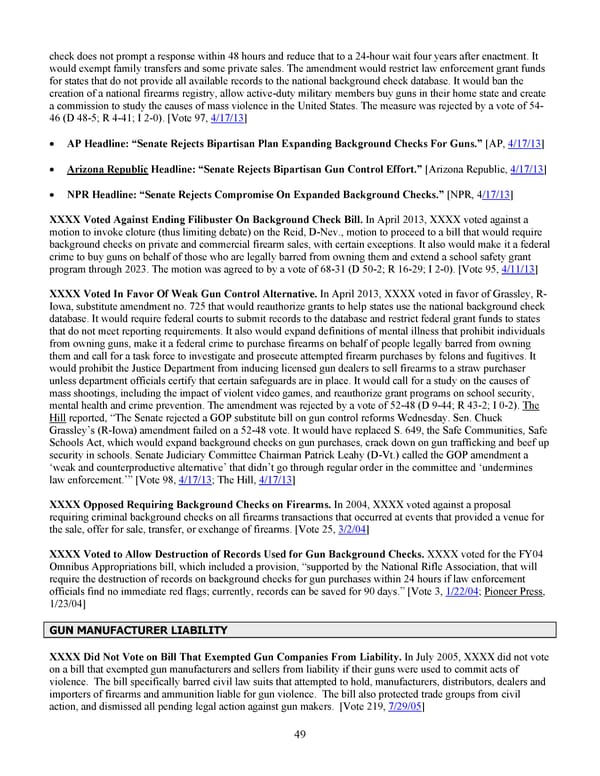check does not prompt a response within 48 hours and reduce that to a 24-hour wait four years after enactment. It would exempt family transfers and some private sales. The amendment would restrict law enforcement grant funds for states that do not provide all available records to the national background check database. It would ban the creation of a national firearms registry, allow active-duty military members buy guns in their home state and create a commission to study the causes of mass violence in the United States. The measure was rejected by a vote of 54- 46 (D 48-5; R 4-41; I 2-0). [Vote 97, 4/17/13] AP Headline: “Senate Rejects Bipartisan Plan Expanding Background Checks For Guns.” [AP, 4/17/13] Arizona Republic Headline: “Senate Rejects Bipartisan Gun Control Effort.” [Arizona Republic, 4/17/13] NPR Headline: “Senate Rejects Compromise On Expanded Background Checks.” [NPR, 4/17/13] XXXX Voted Against Ending Filibuster On Background Check Bill. In April 2013, XXXX voted against a motion to invoke cloture (thus limiting debate) on the Reid, D-Nev., motion to proceed to a bill that would require background checks on private and commercial firearm sales, with certain exceptions. It also would make it a federal crime to buy guns on behalf of those who are legally barred from owning them and extend a school safety grant program through 2023. The motion was agreed to by a vote of 68-31 (D 50-2; R 16-29; I 2-0). [Vote 95, 4/11/13] XXXX Voted In Favor Of Weak Gun Control Alternative. In April 2013, XXXX voted in favor of Grassley, R- Iowa, substitute amendment no. 725 that would reauthorize grants to help states use the national background check database. It would require federal courts to submit records to the database and restrict federal grant funds to states that do not meet reporting requirements. It also would expand definitions of mental illness that prohibit individuals from owning guns, make it a federal crime to purchase firearms on behalf of people legally barred from owning them and call for a task force to investigate and prosecute attempted firearm purchases by felons and fugitives. It would prohibit the Justice Department from inducing licensed gun dealers to sell firearms to a straw purchaser unless department officials certify that certain safeguards are in place. It would call for a study on the causes of mass shootings, including the impact of violent video games, and reauthorize grant programs on school security, mental health and crime prevention. The amendment was rejected by a vote of 52-48 (D 9-44; R 43-2; I 0-2). The Hill reported, “The Senate rejected a GOP substitute bill on gun control reforms Wednesday. Sen. Chuck Grassley’s (R-Iowa) amendment failed on a 52-48 vote. It would have replaced S. 649, the Safe Communities, Safe Schools Act, which would expand background checks on gun purchases, crack down on gun trafficking and beef up security in schools. Senate Judiciary Committee Chairman Patrick Leahy (D-Vt.) called the GOP amendment a ‘weak and counterproductive alternative’ that didn’t go through regular order in the committee and ‘undermines law enforcement.’” [Vote 98, 4/17/13; The Hill, 4/17/13] XXXX Opposed Requiring Background Checks on Firearms. In 2004, XXXX voted against a proposal requiring criminal background checks on all firearms transactions that occurred at events that provided a venue for the sale, offer for sale, transfer, or exchange of firearms. [Vote 25, 3/2/04] XXXX Voted to Allow Destruction of Records Used for Gun Background Checks. XXXX voted for the FY04 Omnibus Appropriations bill, which included a provision, “supported by the National Rifle Association, that will require the destruction of records on background checks for gun purchases within 24 hours if law enforcement officials find no immediate red flags; currently, records can be saved for 90 days.” [Vote 3, 1/22/04; Pioneer Press, 1/23/04] GUN MANUFACTURER LIABILITY XXXX Did Not Vote on Bill That Exempted Gun Companies From Liability. In July 2005, XXXX did not vote on a bill that exempted gun manufacturers and sellers from liability if their guns were used to commit acts of violence. The bill specifically barred civil law suits that attempted to hold, manufacturers, distributors, dealers and importers of firearms and ammunition liable for gun violence. The bill also protected trade groups from civil action, and dismissed all pending legal action against gun makers. [Vote 219, 7/29/05] 49
 HRC vote skeleton Page 56 Page 58
HRC vote skeleton Page 56 Page 58